Suchergebnisse
TANZ – Sondierung Reallabor. Tourismus als Chance für die Energiewende im Pinzgau
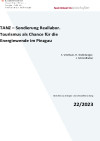
Sondierung für ein regionales Reallabor zur Beschleunigung der Klimaneutralität Österreichs 2040 in der Tourismusregion Pinzgau. Basierend auf zahlreichen Vorarbeiten wurden Realtests für die Innovationsfelder Sektorkopplung, Energiegemeinschaften und Nachhaltige Wärmelösungen konzipiert, die Organisationsstruktur des Reallabors erarbeitet und relevante Akteur:innen aktiv eingebunden.
Schriftenreihe
22/2023
S. Vitzthum, R. Stollnberger, J. Schmidhuber
Herausgeber: BMK
Deutsch, 59 Seiten
Downloads zur Publikation
REGOreal - 100% Renewable Energy Region: Local Energy Common Good Economy in real laboratories for networked energy and mobility cells
In REGOreal, the exploration for a 100% renewable energy region in the area of Retz-Horn-Krems-Tulln (Lower Austria) and Mallnitz (Ktn) is taking place. There are four focus topics: 100 Renewable Energy Communities (REC), 1.000 building renovations, 10.000 energy exporters (in the sense of employees who carry the approach into their private environment) and 100 Mio. km of sustainable mobility with extensive use of IT for the development of local integrated energy systems (IES) to integrate a colorful mix of different actors and objects.
Sondierung für ein Reallabor im zentralen Inntal für klimaneutrale semiurbane Gebiete (INNERGY)
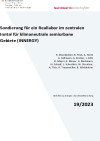
Die Potentiale von Bestandsquartieren und Industriebetrieben für eine nachhaltige Energieversorgung wurden in einem kleinstrukturierten Gebiet ganzheitlich und sektorenübergreifend erhoben und konkrete Umsetzungsprojekte für eine klimaneutrale Region ausgearbeitet.
Schriftenreihe
19/2023
R. Ebenbichler, B. Frick, A. Hertl, A. Hofmann, A. Kratzer, L. Köll, D. Meyer, K. Meyer, A. Riedmann, N. Schaaf, L. Schuchter, W. Streicher, A. Thür, R. Traunmüller, B. Winklehner
Herausgeber: BMK
Deutsch, 22 Seiten
Downloads zur Publikation
CITYGovernance: Übergeordnete klimaneutrale Governance für Städte
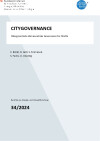
Ziel der F&E Dienstleistung war, Erkenntnisse über Hemmnisse und Hindernisse der übergeordneten Governance für die Zielerreichung “Klimaneutralität von österreichischen Städten” zu erlangen, zu strukturieren und in einer publizierbaren Studie aufzubereiten. Die Studie konzentriert sich dabei auf die Bereiche Energie, Gebäude und Mobilität und enthält Handlungsempfehlungen zu notwendigen Rahmenbedingungen und Änderungsbedarfen.
Schriftenreihe
34/2024
C. Böckl, H. Grill, S. Formanek, S. Fuchs, U. Unzeitig
Herausgeber: BMK
Deutsch, 140 Seiten
Downloads zur Publikation
SOFC-Abwärmenutzung für Gebäude und Industrie (SOFC4City)
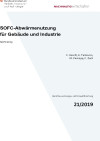
Das hohe Abwärmetemperaturniveau der SOFC-Brennstoffzelle eignet sich prinzipiell um unterschiedliche Wärme- und Stromverbraucher (Wohnbau, Industriebetriebe, ...) bedienen zu können. Ziel ist es, die Abwärme der Brennstoffzelle auf mehreren Temperaturniveaus zur Verfügung zu stellen, um so die Vorteile der Brennstoffzelle besser zu nutzen und den Einsatz für den städtischen Bereich zu prüfen. Einerseits werden die rechtlichen und marktwirtschaftlichen Rahmenbedingungen dazu erhoben, anderseits wird die technische Ausführbarkeit mittels CFD-Simulationen der Wärmeauskopplung sondiert.
Schriftenreihe
21/2019
C. Heschl, E. Terkovics, M. Peinsipp, F. Zach
Herausgeber: BMVIT
Deutsch, 88 Seiten
Downloads zur Publikation
Stakeholderprozess der Initiative "Referenzarchitektur für sichere Smart Grids in Österreich"
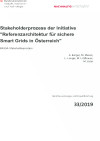
Das Projekt bereitete die Entwicklung einer Smart Grids Referenzarchitektur für Österreich unter Einbindung aller relevanten Akteure auf. Aus den technisch-wissenschaftlichen Grundlagen wurde ein Prozess erarbeitet, der die Anforderungen vom Infrastrukturbetreiber, der Industrie bis zu Bedarfsträgern abholt und zu einer national akzeptierten und international ausgerichteten Referenzarchitektur abstimmt.
Schriftenreihe
33/2019
A. Berger, M. Meisel, L. Langer, M. Litzlbauer, M. Uslar
Herausgeber: BMVIT
Deutsch, 79 Seiten
Downloads zur Publikation
DW² - Entwicklung einer thermisch verbesserten Schlitzwandkonstruktion
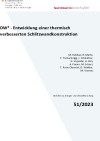
Die thermischen Eigenschaften von Schlitzwandkonstruktionen werden durch die Anwendung neuer Materialien und Herstellungsmethoden verbessert und durch Labor- und Feldversuche validiert sowie durch numerische und ökologische Betrachtungen ergänzt. Das Ergebnis kann bei der Errichtung von energetisch verbesserten unterirdischen Bauwerken wie beispielsweise Tiefgaragen oder zur Herstellung von Erdwärmespeichern verwendet werden.
Schriftenreihe
51/2023
M. Rebhan, R. Marte, F. Tschuchnigg, J. Schleicher, G. Vojvodic, H. Kim, A. Passer, M. Scherz, T. Potrc Obrecht, G. Winkler, M. Vremec
Herausgeber: BMK
Deutsch, 55 Seiten
Downloads zur Publikation
Abwasserreinigung zur hybriden Energiespeicherung, Energiebereitstellung und Wertstoffgewinnung (AR-HES-B)
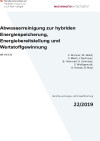
AR-HES-B verfolgt das übergeordnete Ziel, technologische Änderungen der kommunalen Abwasserreinigung zu entwickeln, um die Abwasserreinigung vom Energieverbraucher hin zum hybriden Energieerzeuger und Energiespeicher und als Wertstoffbereitsteller zu erreichen. Durch das AR-HES-B Konzept positioniert sich die städtische Abwasseraufbereitung als eine wichtige Drehscheibe im überregionalen Energie- und Stoffaustausch.
Schriftenreihe
22/2019
C. Brunner, W. Glatzl, S. Meitz, J. Buchmair, B. Hammerl, H. Schnitzer, S. Wohlgemuth, O. Nowak, B. Mayr
Herausgeber: BMVIT
Deutsch, 28 Seiten
Downloads zur Publikation
KLIMUR – Klimaresilientes urbanes Ressourcenmanagement am Fallbeispiel Zukunftshof und Rothneusiedl
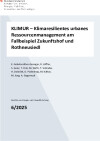
Für das Konzept des Zukunftshofs, einer innovativen urbanen Landwirtschaft, sollen durch Optimierungstools und parametrischem Design Entwicklungsszenarien für ein integriertes Energie- und Ressourcenkreislaufsystem entwickelt werden. Eine Roadmap, bestehend aus technischen Konzepten und einer abgestimmten Finanzierungsstrategie, soll die Grundlagen für ein Demoprojekt liefern, das in der Praxis zeigt, wie der Zukunftshof Ausgangspunkt und Basis für eine ressourceneffiziente und klimaresiliente Stadtentwicklung sein kann.
Schriftenreihe
6/2025
E. Gebetsroither-Geringer, R. Löffler, S. Geier, T. Fink, M. Wirth, T. Vobruba, H. Dolinšek, D. Podmirseg, M. Kaftan, M. Jung, A. Gugumuck
Herausgeber: BMK
Deutsch, 46 Seiten
Downloads zur Publikation
Stadtquartiere mit optimierten solar-hybriden Heiz- und Kühlsystemen (CiQuSo)
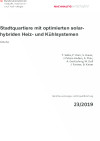
Das Forschungsansuchen untersucht, evaluiert und optimiert effiziente Systemlösungen zur solaren Energieversorgung auf Gebäude- und Stadtquartiersebene. Die Anwendbarkeit der entwickelten Konzepte wird am Beispiel des Salzburger Stadtquartiers Itzling demonstriert.
Schriftenreihe
23/2019
T. Selke, P. Horn, S. Hauer, J. Peters-Anders, A. Thür, A. Goritschnig, W. Doll J. Furtner, B. Kaiser
Herausgeber: BMVIT
Deutsch, 81 Seiten
Downloads zur Publikation
Sondierung des wesentlichen F&E-Bedarfs zur Optimierung von städtischen Energiespeichern in integrierten Energiesystemen (CityStore)
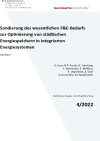
In CityStore wird erstmals ein innovativer Ansatz zur räumlichen Verortung von Speicherbedarf und -potentialen verfolgt. Dies inkludiert die Evaluierung der konkreten Herausforderungen und Voraussetzungen sowie die Identifikation von sinnvollen Speichertechnologien und -kapazitäten. Dazu werden Modellrechnungen für die Vorzeigestädte Graz und Weiz durchgeführt und die Verallgemeinerungsfähigkeit der Ergebnisse anhand der Follower-Region Südburgenland untersucht. Die Resultate sollen optimierte Planung und Realisierung von städtischen Energiespeichern ermöglichen – wodurch zielgerichtet in Energieinfrastruktur zur Umsetzung von (lokalen) Klima- und Energiezielen investiert werden kann.
Schriftenreihe
4/2022
D. Suna, N.P. García, G. Totschnig, S. Wimmeder, E. Meißner, R. Ungerböck, A. Graf, A. Dornhofer, M. Niederkofler
Herausgeber: BMK
Deutsch, 153 Seiten
Downloads zur Publikation
SeasonalGridStorage - Innovative saisonale Wärmespeicher für urbane Wärmenetze

In diesem Projekt wurden Konzepte zur Nutzung innovativer Speichertechnologien, wie thermochemische Speicher (TCS) mit hohen Energiedichten und der Möglichkeit der druck- und verlustlosen Speicherung entwickelt und mit Hilfe von Simulationsrechnungen in technischer, ökologischer und wirtschaftlicher Hinsicht untersucht sowie rechtliche Randbedingungen bewertet.
Schriftenreihe
21/2018
M. Köfinger, D. Basciotti, D. Lager, O. Terreros, C. Zauner, H. Böhm, J. Lindorfer, R. Tichler, A. Zauner
Herausgeber: BMIT
Deutsch, 151 Seiten
Downloads zur Publikation
Umsetzung regionaler Elektromobilitätsversorgung durch hybride Kopplung (Move2Grid)
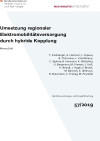
Aufbauend auf den Ergebnissen der „Stadt der Zukunft“ Sondierungsprojekte „Smart Exergy Leoben“, und „Energieschwamm Bruck“ soll im gegenständlichen,umsetzungsorientierten Forschungsvorhaben anhand des Beispiels Leoben untersucht werden, wie mit regionalen, erneuerbaren Ressourcen regionale Elektromobilität langfristig versorgt, optimal ins kommunale Verteilernetzsystem integriert und ökonomisch nachhaltig implementiert werden kann.
Schriftenreihe
57/2019
T. Kienberger, A. Hammer, J. Vopava, B. Thormann, L. Kriechbaum, C. Sejkora, R. Hermann, K. Watschka, U. Bergmann, M. Frewein, J. Koß, H. Brandl, J. Vogel, S. Moser, M. Baresch, K. de Bruyn, R. Braunstein, C. Freitag, M. Peyreder
Herausgeber: BMVIT
Deutsch, 172 Seiten
Downloads zur Publikation
Smart Readiness Indikator: Bewertungsschema und Chancen für intelligente Gebäude (SRI Austria)
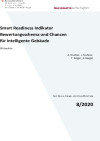
Stakeholder-Befragungen zum Thema "smartness" von Gebäuden, ein Technologiescreening, eine Wirkungsanalyse und Klassifikation möglicher Technologien/Services sowie Masterarbeiten bilden die Basis für einen Vorschlag für die nationale Umsetzung des "Smart Readiness" Indikators von Gebäuden und Begleitmaßnahmen.
Schriftenreihe
8/2020
A. Knotzer, J. Fechner, T. Zelger, A. Berger
Deutsch, 67 Seiten
Downloads zur Publikation
Leitfaden für nachhaltige Energieversorgungskonzepte für Quartiere
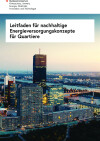
In diesem Leitfaden werden Wärmepumpentechnologien, Solarthermie, Biomasse, Kraft-Wärme-Kopplungen, Fern- sowie Nahwärme und Brennstoffzellen als künftige nachhaltige zentrale bzw. dezentrale Energieversorgungssysteme in Quartieren betrachtet und hinsichtlich ihrer Eignung bewertet.
G. Weber, M. Banozic, B. Fina, D. Horak, G. Zucker
Herausgeber: BMK
Deutsch, 76 Seiten
Downloads zur Publikation
Erforschung des ersten österreichischen Erneuerbare-Energiegemeinschaften Gewerbe- und Industrieparks (REC-Businesspark)
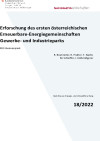
Im Zuge des Projekts erfolgte die Konzeptionierung eines Zero-Emission- bzw. Plus-Energie-Gewerbeparks in Weiz mit Fokus auf Photovoltaik und Brennstoffzelle in Kombination mit einer Erneuerbaren Energiegemeinschaft (E-EGe). Durch die Gründung auf der "grünen Wiese" können sämtliche Strukturen entsprechend den Anforderungen der E-EGe geschaffen werden.
Schriftenreihe
18/2022
R. Bramreiter, R. Pratter, T. Nacht, M. Schloffer, I. Kolb-Stögerer
Herausgeber: BMK
Deutsch, 48 Seiten
Downloads zur Publikation
DW² - Entwicklung einer thermisch verbesserten Schlitzwandkonstruktion
Die thermischen Eigenschaften von Schlitzwandkonstruktionen werden durch die Anwendung neuer Materialien und Herstellungsmethoden verbessert und durch Labor- und Feldversuche validiert sowie durch numerische und ökologische Betrachtungen ergänzt. Das Ergebnis kann bei der Errichtung von energetisch verbesserten unterirdischen Bauwerken wie beispielsweise Tiefgaragen oder zur Herstellung von Erdwärmespeichern verwendet werden.
DW² - Thermal improvements on diaphragm walls
New materials and installation methods for diaphragm walls will be investigated in laboratory and field tests in order to improve the thermal properties of the construction elements. Additional numerical and ecological aspects are considered to ensure an energetic enhancement of underground constructions such as underground garages or thermal energy storages.
ÖKO-OPT-QUART - Economically optimized control and operating mode of complex energy networks of future city districts
In the project ÖKO-OPT-QUART energy-based, economic and control-orientated models will be developed in order to simulate the operating mode of complex, sustainable energy networks in city districts. For an exemplary configuration these models will be combined to an overall model which allows a realistic economic comparison of different control strategies. The final goal of the project is the development of a method for the systematic design of cost-optimized, predictive control strategies for complex energy networks in city districts.
TANZ - Sondierung Reallabor: Tourismus als Chance für die Energiewende im Pinzgau
Sondierung für ein regionales Reallabor zur Beschleunigung der Klimaneutralität Österreichs 2040 in der Tourismusregion Pinzgau. Basierend auf zahlreichen Vorarbeiten wurden Realtests für die Innovationsfelder Sektorkopplung, Energiegemeinschaften und Nachhaltige Wärmelösungen konzipiert, die Organisationsstruktur des Reallabors erarbeitet und relevante Akteur:innen aktiv eingebunden.
